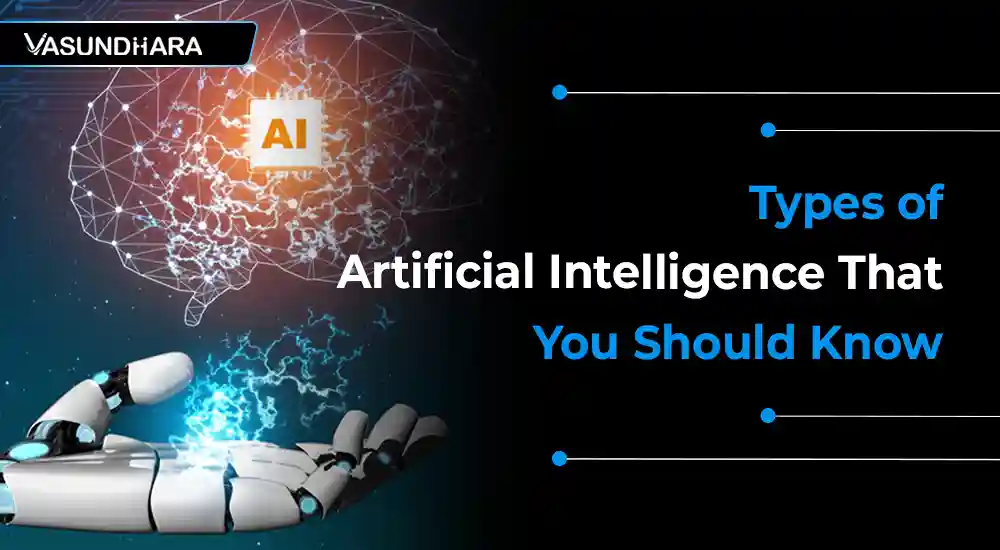Types of Artificial Intelligence That You Should Know


- Aug 28, 2024
Artificial Intelligence (AI) has transitioned from a futuristic concept to an integral part of our daily lives. From virtual assistants that manage our schedules to algorithms that drive personalized recommendations, AI is influencing how we live, work, and interact with technology. As AI continues to evolve, understanding its various types becomes essential for anyone looking to grasp the future of technology.
This blog will delve into the different types of AI, classified both by their functionality and their capabilities.
Artificial Intelligence (AI) is a branch of computer science that concentrates on the development of intelligent machines that possess the ability to reason and learn in a manner similar to that of humans.
AI technology allows machines to replicate human intellect and enhance the capabilities of the human mind. AI systems can autonomously process data, interpret utterances, analyze patterns, identify objects, and make decisions.
Presently, AI is employed in a variety of sectors, including finance, healthcare, and retail, as well as automobiles.By outsourcing processes or tasks that are currently performed manually, AI is enhancing business performance and productivity.
Companies are progressively utilizing the capabilities of AI to acquire a deeper understanding of their customers' preferences and behaviors. Additionally, they can enhance business efficiency and decrease expenses by employing this data.
Some examples of Artificial Intelligence:
Also read: How To Build An AI Software: A Comprehensive Guide
The following processes and techniques are frequently employed to address real-world issues using artificial intelligence:
Also read: How To Integrate AI Into An App
Artificial intelligence is classified into two primary categories: functionalities and capabilities. To comprehend it, it is essential to differentiate between the various varieties of AI and the current state of the technology.
Narrow AI, also known as Weak AI, is a type of artificial intelligence that concentrates on a narrow activity or region. It is intended to accomplish a specific set of activities and has the ability to learn through data. It can be used to automate a variety of day-to-day tasks, aid decision-making, increase efficiency, and save expenses.
It is widely employed in various areas, including finance, healthcare, robotics, and retail. Narrow AI has the potential to alter enterprises by allowing people to focus on complicated activities while robots handle ordinary jobs.
Examples of Narrow AI:
Also read: How AI is Transforming the Financial Services Industry
General AI, also known as Strong AI, is a type of artificial intelligence in which machines are supposed to think, reason, and behave like humans. It can learn, reason, and make judgments in a variety of circumstances. The concept of General AI is still in its early phases, with researchers having yet to realize it.
General AI can be utilized for a variety of applications, including NLP (natural language processing), image identification, robotics, and more. It can also help automate difficult operations that would normally require human intervention. General AI has the potential to transform the way humans engage with technology in the future.
Artificial Superintelligence (ASI) or Super AI would surpass human performance. ASI machines are anticipated to transcend human intelligence and be self-aware. They are capable of completing any task more efficiently than humans. Super AI is still a hypothetical concept.
Artificial superintelligence is widely regarded as the most sophisticated and potent form of AI, exhibiting attributes such as decision-making, problem-solving, and cognitive abilities. Additionally, ASI has the capacity to interpret human emotions and experiences.
Reactive machines are the most fundamental and ancient forms of AI systems that are entirely reactive. They possess restricted capabilities and lack memory-based functionality. In other words, reactive devices are incapable of learning from their past experiences and reacting to their surroundings.
These devices replicate the human mind's capacity to respond to various inputs. Reactive machines could only be employed to respond to a restricted set or combination of inputs autonomously.
For instance, IBM's Deep Blue was a reactive machine, a chess-playing supercomputer that defeated chess grandmaster Garry Kasparov in 1997. This computer employed real-time intuitions to play chess.
Limited memory machines are capable of learning from past experiences and utilizing that data to make decisions, in addition to possessing the capabilities of reactive machines. This category encompasses virtually all contemporary AI systems, including chatbots, self-driving vehicles, and virtual assistants.
Limited theory machines store large volumes of data to serve as a reference for resolving future issues. For instance, an image recognition system is configured with numerous training images and labels to instruct it on the name of the object it is examining. Therefore, when it analyzes an image in the future, it employs these previous images as a reference to identify the new one.
Researchers are working to create the next advanced level of AI systems: theory of mind. Right now, it's only a theoretical idea.
Mental theory Because AI computers will concentrate on emotional intelligence, they will play a critical role in psychology. This kind of AI requires a thorough comprehension of how people behave and feel in different environments.
The robots Kismet and Sophia are two instances of mind machines. Professor Cynthia Breazeal created Kismet, a robot, at the Massachusetts Institute of Technology in the 1990s. Kismet could identify human facial emotions and could imitate them using its own facial features, including its eyes, mouth, ears, eyebrows, and eyelids.
Compared to earlier iterations, Sophia, a humanoid robot developed by Hanson Robotics in 2016, is distinguished by its strikingly human-like appearance, facial expressions, and behavior.
Self-awareness is the most advanced and final stage of AI, and it is presently a hypothetical concept. This will be feasible when machines acquire self-awareness and exhibit consciousness comparable to that of humans. AI machines that are self-aware will possess the same emotions, requirements, and desires as humans.
The development of self-aware AI machines may require decades or even centuries. The concept of self-awareness can be viewed as an extension of the theory of mind. The distinction will be that self-aware machines will possess their own thoughts and reactions.
Also read: Role Of AI In Fintech Development: Top Use Cases
AI is transforming various industries by enabling new capabilities and improving efficiency. Here’s how AI is making an impact across different sectors:
AI is revolutionizing healthcare by enabling more accurate diagnostics, personalized treatment plans, and efficient data management.
Applications: AI-driven systems can analyze medical images, predict disease outbreaks, and assist in drug discovery. For example, AI algorithms can detect patterns in medical images that are invisible to the human eye, leading to early diagnosis of conditions like cancer.
Impact: AI is improving patient outcomes by providing faster, more accurate diagnoses and enabling personalized treatments based on individual genetic profiles.
In the finance industry, AI is used for fraud detection, risk management, and algorithmic trading, among other applications.
Applications: AI systems analyze transaction data to detect fraudulent activities, assess credit risk, and optimize trading strategies. For instance, AI-powered trading algorithms can analyze vast amounts of data in real-time to make profitable trades.
Impact: AI is enhancing security and efficiency in financial transactions, reducing human error, and enabling more informed decision-making.
AI is driving automation in manufacturing, leading to more efficient production processes and improved product quality.
Applications: AI is used in predictive maintenance, where it can predict equipment failures before they occur, reducing downtime and maintenance costs. AI-powered robots are also increasingly used for assembly line tasks, quality control, and supply chain optimization.
Impact: AI is increasing productivity, reducing costs, and enabling manufacturers to respond more quickly to changes in demand.
AI is transforming the entertainment industry by enabling personalized content creation, enhancing user experiences, and even generating new forms of media.
Applications: Streaming services like Netflix and Spotify use AI algorithms to recommend content based on user preferences. AI is also used in video game development for creating intelligent characters and enhancing gameplay experiences.
Impact: AI is providing more engaging and personalized experiences for users, driving the creation of new content, and even assisting in the creative process.
AI is still in its early stages, with much potential for growth and innovation. The future of AI will likely see advancements in both its capabilities and applications.
As AI continues to evolve, we can expect to see more advanced forms of AI, such as Theory of Mind and Self-Aware AI, becoming a reality. These advancements will enable machines to interact with humans more naturally and intelligently.
AI will continue to disrupt industries by providing new ways to solve problems and create value. In addition to improving efficiency and productivity, AI will also raise new ethical and societal challenges that will need to be addressed.
As AI becomes more powerful, questions around ethics, privacy, and security will become increasingly important. Ensuring that AI is developed and used responsibly will be crucial to maximizing its benefits while minimizing potential risks.
Artificial Intelligence is a rapidly advancing field that is reshaping the world as we know it. Understanding the different types of AI is essential for anyone looking to stay informed about the future of technology. From Narrow AI systems that are already in use today to the theoretical possibilities of General and Super AI, each type of AI offers unique capabilities and challenges.
AI is not just a technological trend but a fundamental shift in how we approach problem-solving, decision-making, and innovation. As AI continues to evolve, it will undoubtedly play a central role in shaping the future of industries, economies, and societies.
Staying informed about AI developments is crucial for businesses and individuals alike. Whether you’re looking to implement AI solutions in your organization or simply want to understand the technology better, keeping up with the latest advancements is key.
At Vasundhara Infotech, we specialize in providing cutting-edge tech solutions by integrating AI tailored to your needs. Our team of experts is equipped to help you leverage AI to drive innovation and achieve your business goals.
Contact us today to learn more about how we can assist you in navigating the world of AI.
Copyright © 2026 Vasundhara Infotech. All Rights Reserved.
